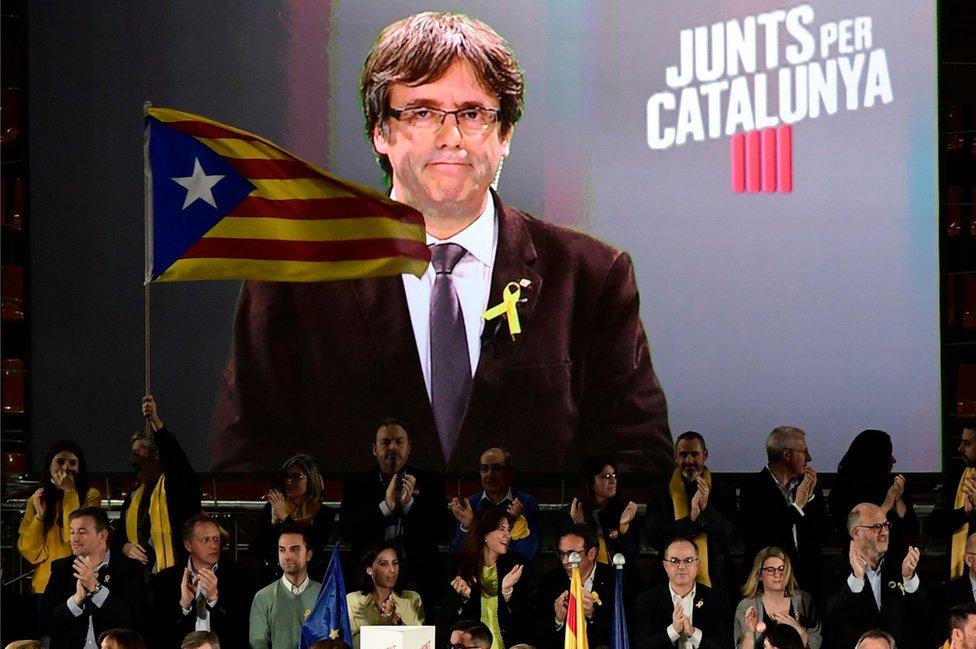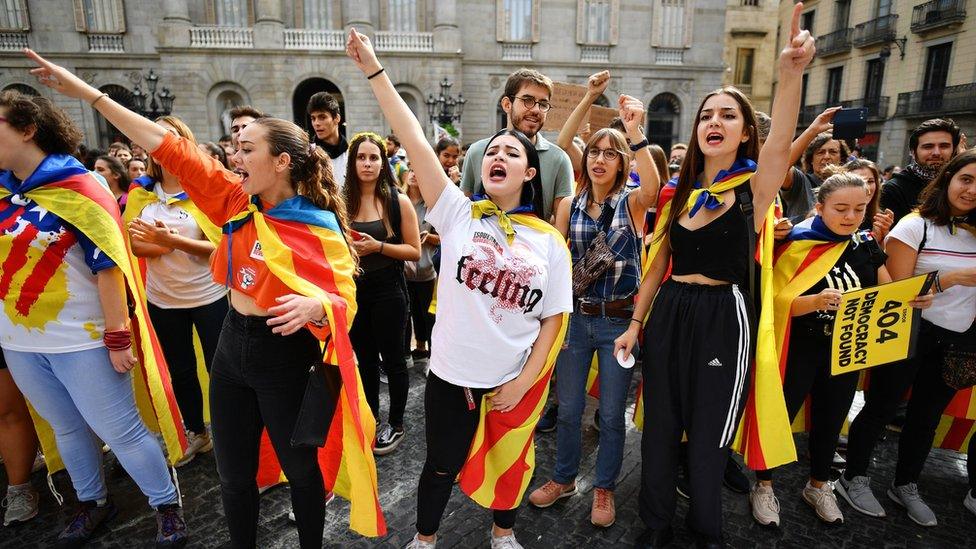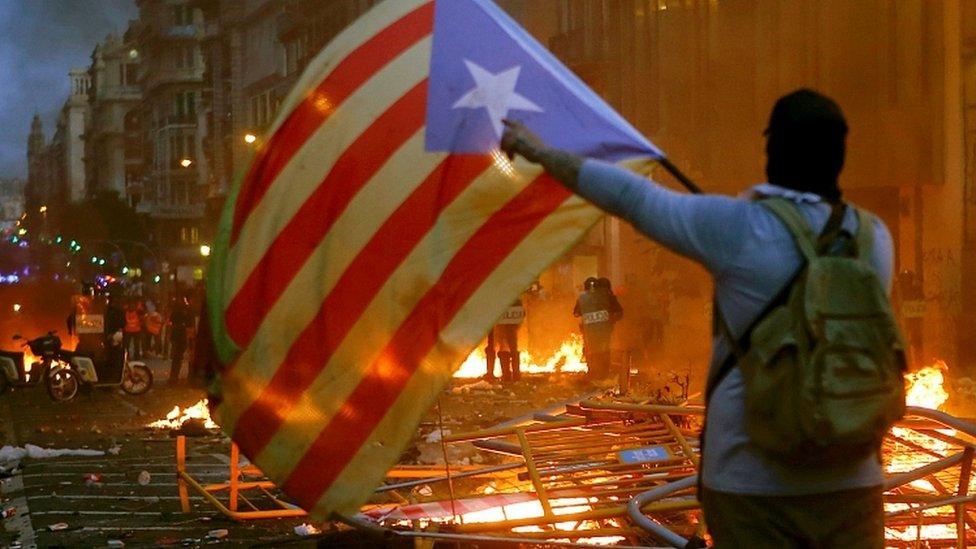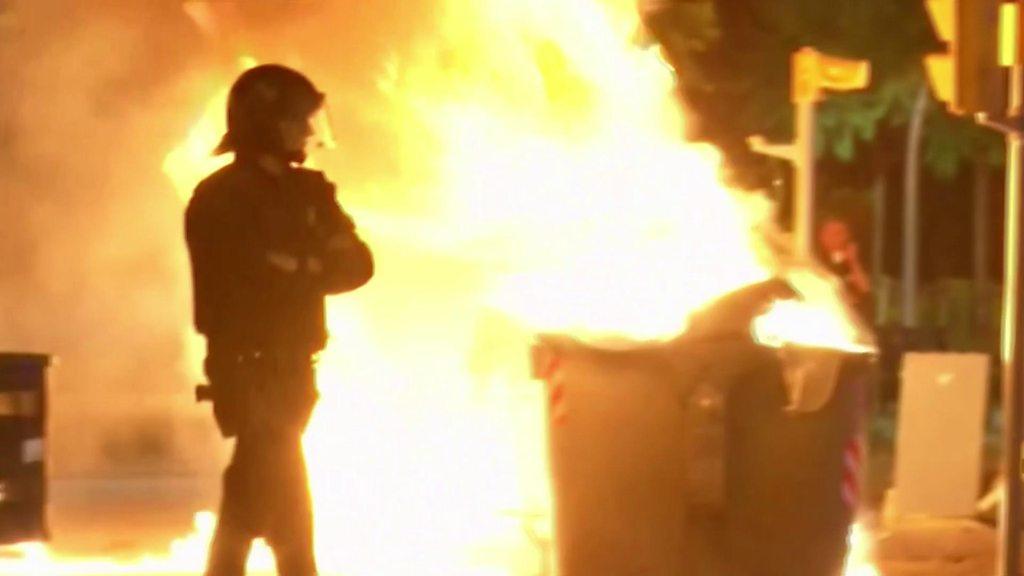Catalonia's bid for independence from Spain explained
- Published

Carles Puigdemont rallies separatists via videolink from Brussels
Catalonia's independence movement is back in the headlines after Spain's Supreme Court jailed nine separatist leaders, prompting days of protests.
The crisis first flared in October 2017, when a banned independence referendum was met with a heavy police crackdown.
Madrid imposed direct rule on the region shortly after.
It is the country's biggest political crisis since democracy was restored in 1975, after the death of military dictator General Francisco Franco.
What's the context?
Catalonia is one of Spain's wealthiest and most productive regions and has a distinct history dating back almost 1,000 years.
Before the Spanish Civil War it enjoyed broad autonomy but that was suppressed under Gen Franco.
When Franco died, the region was granted autonomy again under the 1978 constitution, external and prospered as part of the new, democratic Spain.
A 2006 statute granted even greater powers, boosting Catalonia's financial clout and describing it as a "nation", but Spain's Constitutional Court reversed much of this in 2010.

Many Catalans feels they would be better off as an independent nation
The 2008 financial crash and Spanish public spending cuts fuelled local resentment and separatism.
There is a widespread feeling that the central government takes much more in taxes than it gives back.
But the complexity of budget transfers makes it hard to judge exactly how much more Catalans contribute than they get back from investment in services, such as schools and hospitals.
How did we get here?
Following a symbolic referendum in November 2014, outlawed by Spain, separatists won the 2015 regional election.
Catalonia's pro-independence leaders then went ahead with a full referendum on 1 October 2017, which was also declared illegal by Spain's constitutional court.
Organisers said 90% of voters backed a split. But turnout was only 43% amid a boycott by unionists.
In a febrile atmosphere the separatist majority in the Catalan parliament declared independence on 27 October.
Using the Article 155 emergency powers, Madrid dissolved parliament, sacked its leaders and called a snap election for 21 December.
Separatists won a slim majority. The following May, Catalonia's parliament swore in Quim Torra as their new president, after Madrid blocked several other candidates. Mr Torra vowed to continue fighting for independence.
The sight of Spanish national police beating voters, and politicians being jailed, revived disturbing memories, for some, of the Franco dictatorship.
Catalan protests: Watch dramatic street battles in Barcelona on Wednesday
Carles Puigdemont - then Catalan president - fled abroad with several other leaders. Many who remained were arrested and charged with treason.
Spain's Supreme Court finally sentenced nine of the arrested Catalan leaders in October, sparking the latest unrest.
Former vice president Oriol Junqueras was handed a 13-year prison sentence for sedition and misuse of public funds. The other eight receive sentences of between 12 and 9 years.
Demonstrators took to the streets in fury and have repeatedly clashed with police in some of the worst street violence to hit Spain in decades.
If the separatists do ever manage to split away, it would be hard for Catalonia to win recognition internationally.
New states mostly emerge from situations where ethnic groups have been victims of genocide or other major human rights abuses.
Kosovo was a huge humanitarian crisis for Europe - even so, many countries refuse to recognise it as independent.
What does the crisis mean for the country?
Catalonia has its own language and distinctive traditions, and a population nearly as big as Switzerland's (7.5 million). It is one of Spain's wealthiest regions, making up 16% of the national population and accounting for almost 19% of Spanish GDP.
It's also a vital part of the Spanish state, locked in since the 15th Century.
Alonso Romero feels perfectly integrated in the Catalan town of Santa Coloma, but he remains loyal to Spain
Barcelona has become one of the EU's best-loved city-break destinations, famed for its 1992 Summer Olympics, trade fairs, football and tourism.
Generations of people from poorer parts of Spain have moved there for work, forming strong family bonds with regions such as Andalusia.
During this crisis, the Catalan economy has suffered. Thousands of businesses, including major banks and energy firms, have moved their headquarters out of the region.
The EU has treated the crisis as an internal matter for Spain, deaf to the separatists' pleas for support.
However, there have been warnings that the issue is damaging Spain's democratic credentials.
In 2017 the Economist Intelligence Unit, which compiles an influential annual democracy ranking, said Spain risked being downgraded from a "full democracy" to a "flawed" one over its handling of the situation.
- Published18 October 2019

- Published17 October 2019
